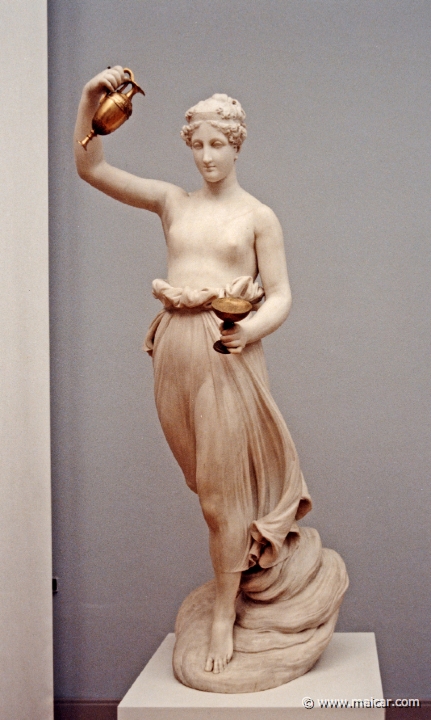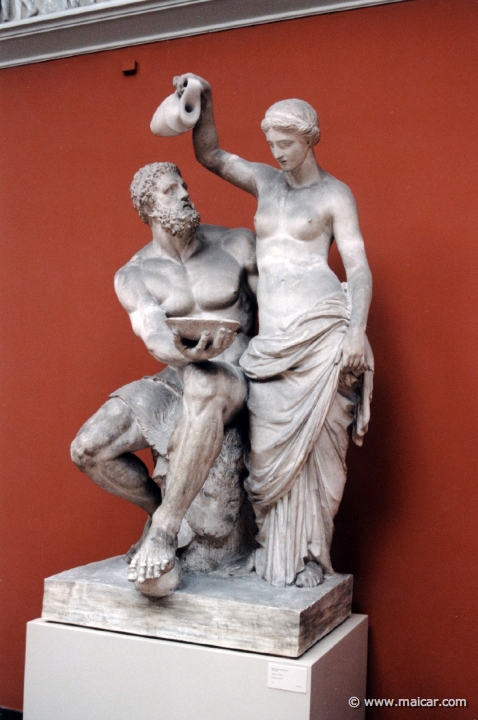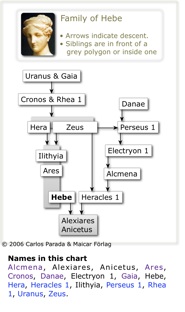 |
|
Hebe
Ἥβη |
|
|

|
Hebe. 2111: Statue by Antonio Canova, 1757-1822. Altes Museum, Berlin.
|
|
|
"Hebe, the most beautiful of the goddesses, walks forever in Olympus beside her mother Hera, goddess of marriage" (Pindar, Nemean Odes 10.15).
"I am no worshipper of Hygia, who was the daughter of that old herb-doctor Asclepius … but rather of Hebe … who had the power of restoring gods and men to the vigour of youth. She was probably the only thoroughly sound-conditioned, healthy, and robust young lady that ever walked the globe, and whenever she came it was spring." (Henry David Thoreau 1817-1862, Walden).
|
|
Hebe is Youth.
She is the cup-bearer in Heaven—being called Ganymeda—and pours the nectar to the gods when they are assembled. At times she does other things too, like helping Hera to prepare her chariot, or bathing Ares after a battle.
Hebe married Heracles 1 after he obtained immortality, and has by him two sons: Alexiares and Anicestus. After the death of Heracles 1, the whole family dwells among the OLYMPIANS.
Hebe has the power to restore youth, and when old Iolaus 1 (Heracles 1's former charioteer) was about to fight against Eurystheus, he prayed to Hebe to be young again for one day, and this the goddess granted to him.
It is told that the Phliasians, who lived near Sicyon, honored Hebe (whom they called Dia) by pardoning suppliants.
|
|

|
4906: Jens Adolph Jerichaü 1816-1883: Hercules and Hebe, 1845. Ny Carlsberg Glyptotek, Copenhagen.
|
|
Impetuous and unexperienced Youth
It has been said that the heart of Youth is stiff with pride and that its mouth utters folly. Youth has been called both impetuous and mad, and being unable to control its impulses is thought to pursue impossible things with its ambition. The mistakes of insolent Youth are so many that some have thought that mortal men and women should live their Youth twice before reaching Old Age, so that previous slips could be corrected. For unexperienced Youth, believing whatever it hears, is easy to defile, and so the faults are numerous.
Arrogant Youth
Youth has also been called slow of tongue and quick of hand. For relying mainly on its strength, Youth prefers action. But in the course of it, Youth may display arrogance and an unjust spirit, since Youth and good sense are seldom seen together. Yet Youth is still considered to admit improvement in every way. But if deprived—through whatever kind of slavery—of growth and straightforwardness, Youth is forced to commit crooked acts that later become a heavy burden of fears and dangers. And since Youth cannot carry such a burden upright, it turns to deceit and to requiting wrong with wrong. By acting in such a way, they assert, Youth comes to manhood or womanhood with no soundness of mind, though still believing itself to be very clever. But to raise up age or Old Age when Youth has been ruined is, some believe, quite a paltry task.
Prayer
Things being that way, some have prayed that their Youth and Old Age be joined in a secure life, and woven through to the end in good fortune, believing that out of the efforts undertaken by Youth and Justice, there comes a gentle life when Old Age approaches. For Youth, they assert, should not be kept restrained and hidden in a pocket, but used to perform noble deeds. And they think that he who does no wrong in any deed deserves to win the better kinds of love.
Death and Youth
It has been said that Youth, being generous and tender, may sacrifice life for city or country, and that the boldness and the vigour of Youth is of much help in terrible wars. Yet Youth is expected to live and not die, and that is why the meeting of Death and Youth is always regarded as a very unhappy circumstance, be it in war or in peace. For, as it has been repeatedly said, it is a most painful thing to leave a healthy and vigorous body.
Departure of Youth
And when Youth nevertheless departs, some do not miss it whereas others do. For certain humans, having thought that Youth obey many mad masters, feel released when Youth leaves with its fierce passions and bursting tensions that forbid relaxation. But others complain, longing for their lost joys and thinking that the life they now lead is nothing compared to the pleasurable days and nights Youth provided. Most mortals pay reverence to fair Youth, and name it beside other good things such as Wealth, Peace, laughter, songs, wine, and feasts. For the beauty of Youth in its blossom has always been admired, and there is no one who does not wish to pluck the bloom of Youth, which is the season of love. Accordingly, all turn their eyes away from Old Age, choosing to look at the swelling flower of Youth, which has been called the herald of the divine embraces of Aphrodite. And the fruit of golden-crowned Youth is so desirable that even Immortality, which otherwise is held in very high esteem, has been imagined to be worthless without Youth.
|
|

|
Genealogical Charts
Names in this chart: Alcmena, Alexiares,
Anicetus, Ares, Cronos, Danae, Electryon 1, Gaia, Hebe, Hera, Heracles 1, Ilithyia, Perseus 1, Rhea 1, Uranus, Zeus.
|
|
| Related sections |
|
|
|
Sources
Abbreviations |
Apd.1.3.1, 2.7.7; Hes.The.922, 951;
Hom.Il.4.1; Hom.Od.11.603; Nonn.27.248,
31.253; Pau.2.13.3; Pin.Isth.4.59.
|
|
|